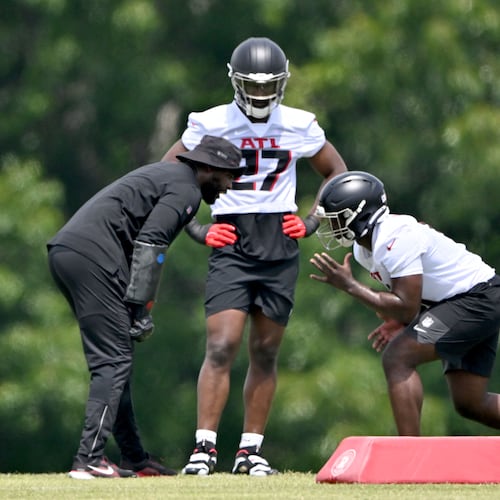With only five games left in the season, the Falcons’ offense is on pace to scored 521 points, which would shatter the franchise record of 442 that was set in 1998, the same season they finished 14-2 and went to the Super Bowl.
But before you get dizzy with anticipation …
This same team also is on pace to allow 439 points, which would rank as the fourth most in franchise history. The only three teams that allowed more points finished 3-13 (461 in 1996), 4-12 (452 in 1985) and 4-12 (443 in 2013).
Some teams keep you on the edge of your seat. Rare is the team that both glues you to a television screen and makes you want to cover your eyes, depending on the possession.
The Falcons will go only as far as their offense carries them. That’s not a revelation in late November. They were an offense-oriented team even before signing center Alex Mack and wide receiver Mohamed Sanu to free agent deals in the offseason, and the NFL’s salary cap basically limits teams to spending their money on one side of the ball or the other. Some positions are going to get short-changed (and short-dollared).
But even in the aftermath of an impressive 38-19 win over Arizona, which raised the Falcons’ record to 7-4 and stirred the masses, it was reaffirmed that the Falcons will be trying to buck history for a long playoff run to the Super Bowl.
The injury news that has surfaced since Sunday is not good. The Falcons have lost Desmond Trufant, their best defensive player, for the season to a torn pectoral muscle. They also lost defensive end Adrian Clayborn in the Arizona game to a reported torn MCL and torn meniscus in his left knee, probably sidelining him for a month.
Clayborn may not rank with Trufant, Vic Beasley Jr. or Keanu Neal in terms of importance to the defense but he’s up there, ranking second on the team with 4 1/2 sacks, first in total snaps among defensive linemen and has a fumble recovery for a touchdown. This follows having lost defensive end Derrick Shelby and linebacker Sean Weatherspoon, both to torn Achilles injuries.
Every team has injuries. But the starting point on the Falcons’ defense wasn’t great, so to take such a significant hit to their depth — and in a season when Matt Ryan and the offense rank at or near the top of most statistical categories — threatens to undo a potentially special season.
If the Falcons are looking for a reference point to suggest they can overcome defensive issues, they can start with the 2011 New York Giants. That team won the Super Bowl — a 21-17 upset of New England — despite a regular season that saw them finish 25th in scoring defense, 27th in total defense and 29th in pass defense. Those Giants also were the first team in NFL history to win the Super Bowl despite being outscored during the regular season (400-394).
The Falcons’ defense through 11 games/12 weeks: 29th in scoring defense, 27th in total defense and 32nd in pass defense. Feeling lucky?
Enjoy the show. The Falcons’ offense is like a video-game player’s dream. But their defense is like what happens when the Red Bull and Nacho Cheese Doritos rush wears off.
Coach Dan Quinn said, “We don’t generally say, ‘Next man up,’” but that’s effectively what he said Monday, following with: “As you’re part of this team, we recognize the value you have. That’s why we push each guy to take him as far as we can, knowing when your (opportunity) is called, you’re ready to answer. ‘Here’s my opportunity, I’m going to go nail it.’”
He said what coaches are supposed to say: Here’s your job, now go run through a wall. But as a former defensive coordinator, Quinn surely recognizes how losing Trufant and Clayborn, in particular, hurt this team.
Two of the last three Super Bowl winners, Denver last season and Seattle in 2013, had the league’s best defenses. But there have been a handful of teams other than the 2011 Giants who overcame liabilities on that side of the ball to win Super Bowls:
• The 2009 New Orleans Saints finished 20th in points against (25th in total defense) but first in scoring.
• The 2007 Giants finished 17th in points against (but an impressive seventh in total defense) and a modest 14th in scoring.
• The 2006 Indianapolis Colts finished 23rd in points against (21st in total defense) but second in scoring.
• The 2001 New England Patriots finished only 24th in total and pass defense but were the ultimate bend-but-don’t-break unit, ranking sixth in points against.
Among the poor defensive teams that reached the Super Bowl but lost included the 2008 Arizona Cardinals (tied for third scoring, 28th in points against; lost to Pittsburgh 27-23) and the 1991 Buffalo Bills (second in scoring, 19th in points against; lost to Washington 37-24).
So there is precedence. It’s just not the easiest way to get there.
About the Author
Keep Reading
The Latest
Featured


